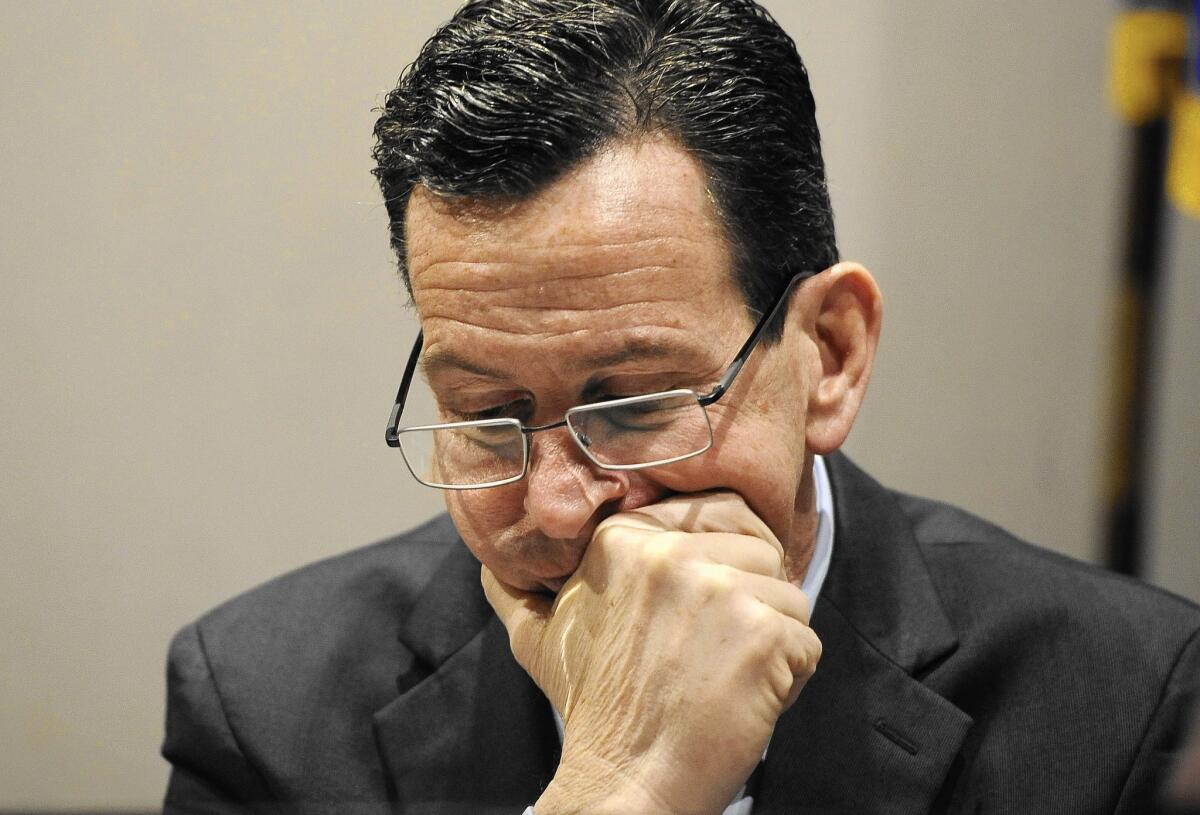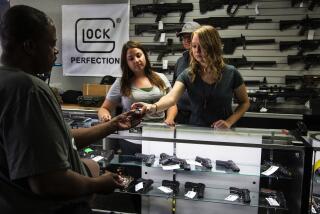Connecticut wants its own gun sale ban based on terrorism watch lists

Connecticut Gov. Dannel P. Malloy says states must act on gun control.
After last week’s mass shooting in San Bernardino, the state of Connecticut will seek to ban gun sales to prospective buyers who are on the nation’s “no-fly” list and other terrorism watch lists, its governor announced Thursday.
The move comes in response to the failure of federal efforts to strengthen gun control. Congress has blocked President Obama’s attempts to add names on the no-fly list to the federal background check system that flags gun sales to ex-convicts, the mentally ill and other groups deemed unfit to own firearms.
But in Connecticut — which enacted some of the nation’s most stringent gun control laws after the 2012 massacre at Sandy Hook Elementary School in Newtown — Gov. Dannel P. Malloy suggested he would do what Congress wouldn’t.
“If Congress will not act, we in the states will,” Malloy, a Democrat, said in a news conference outside his office Thursday afternoon.
Malloy said he would deny gun purchases to would-be buyers “who represent a real risk, as opposed to a made-up one or perceived one.... I am frustrated that our nation is having the wrong debate [about gun control and terrorism], and I’d like to see us focus on the right one.”
Syed Rizwan Farook and Tashfeen Malik, the married couple who killed 14 people in San Bernardino, apparently had escaped the attention of federal authorities before carrying out the attack, which officials have said was an act of terrorism.
Both would have passed recent U.S. background checks: Malik when she successfully obtained a K-1 visa to enter America to marry Farook, and Farook when he legally purchased two of the handguns used in the Dec. 2 attack.
Officials have said the couple, killed in a shootout with police, had modified or attempted to modify two semiautomatic rifles to make them fully automatic or carry a larger-capacity magazine. Those modifications are illegal in California.
Both rifles had been legally purchased by a friend, Enrique Marquez, who is now under investigation. Officials have said there is no paperwork showing that Marquez transferred ownership of the rifles to Farook and Malik.
With Congress reluctant to place new restrictions on expanded magazines or semiautomatic rifles, Democrats’ latest push for stronger gun control has instead focused on expanding the nation’s existing background check system.
The National Instant Criminal Background Check System, put in place in 1998, is on pace to break its 2013 record for the most background checks in a year. As of November, there have been almost 20 million checks this year.
The system already prevents gun sales to felons, drug addicts and immigrants in the U.S. illegally as well as prospective buyers on the National Crime Information Center’s “known or appropriately suspected terrorists” list.
In 2014, 9% of checks by federal regulators resulted in delayed sales, with just over 1% resulting in final denials.
The background check database also bars sale to buyers “adjudicated as a mental defective or committed to a mental institution,” though critics say there’s more work to be done on that front.
SIGN UP for the free Essential Politics newsletter >>
On Thursday, the advocacy group Everytown for Gun Safety released a report saying that U.S. states were making progress in adding mental health records for “dangerously mentally ill” people to the database.
From 2012 to 2014, the number of mental illness records in the database more than doubled, the analysis found. As a result, the number of rejected gun sales on the grounds of mental incapacitation jumped from 3,103 in 2012 to 6,077 in 2014, the group said.
But some states have continued to lag: Alaska, Montana, New Hampshire, Oklahoma, Vermont and Wyoming each having submitted fewer than 100 records as of June, according to the group’s analysis. New Hampshire contributed only two mental health records for the entire state.
“A half-dozen states are still failing to uphold their obligations to public safety, leaving fatal gaps in the background check system,” Ted Alcorn, the group’s research director, said in a statement.
“It only takes one gun in the wrong hands to result in tragedy.”
Twitter: @MattDPearce
The Hartford Courant contributed to this report.
More to Read
Start your day right
Sign up for Essential California for news, features and recommendations from the L.A. Times and beyond in your inbox six days a week.
You may occasionally receive promotional content from the Los Angeles Times.







